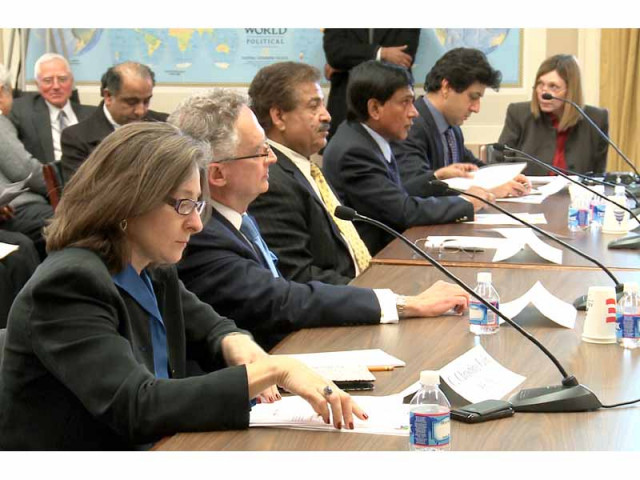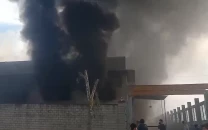Following years of neglect, Balochistan issue taken up by US congressional panel
Committee members heard numerous testimonies to begin larger US dialogue on the province.

Not putting its own house in order for decades has cost Pakistan face, and could yet cost more.
For the first time, decades of simmering strife, disenfranchisement and disenchantment in Balochistan made it to the limelight in the US – and not unexpectedly Pakistan was cast in negative light in a US congressional hearing.
In a packed room of the Rayburn House Office Building, members of the House Foreign Affairs’ Subcommittee on Oversight and Investigations on Thursday focused on condemning the Pakistani government and accusing it of broad human rights abuses against the Baloch.
But the extraordinary hearing, attended heavily by the Baloch diaspora, who led several rounds of applause after speeches by the committee’s members, offered no clear aim of what it wanted to achieve or how to address the issues facing the province.
The sudden interest in Balochistan, coupled with keen condemnations from human rights groups, comes with serious undertones. Last month, Congressman Dana Rohrabacher, a Republican who organised and chaired the hearing yesterday, drafted a policy paper condemning the Obama Administration, and proposed that the US pursue an independent Baloch state “carved out of Pakistan,” nominally to defeat the Taliban.
Nevertheless, though the motives remain unclear, the hearing did set the stage for the province to be closely monitored by the international community in the years to come.
In his opening remarks, Rep Rohrabacher said that Balochistan was a turbulent land marked by human rights violations “by regimes that are against US values”. The congressman outlined the history of Pakistan’s creation, and highlighting Balochistan’s grievances vis-a-vis natural resources, said that the province’s due share was being usurped by the dominant elite.
The hearing, attended by think tankers, Capitol Hill staffers, journalists and members of the Baloch diaspora also included lobbyist for the Embassy of Pakistan Mark Siegel.
Addressing the committee, scholar and analyst professor Christine Fair said that while she understood that sentiments were running high, nationalist groups in Balochistan were also targeting those belonging to other provinces. “Many of those teachers have been singled out because they’re Punjabi, and it’s not just teachers, also providers of other human services, police in particular are very vulnerable.”
Furthermore, the professor, who had termed the meeting as merely a “stunt” on Twitter a day earlier, added that Pakistan’s human rights abuses have actually served US interests in the region.
In his submitted testimony to the committee, Amnesty International’s Advocacy Director T Kumar said that they called on the US to “apply the Leahy Amendment without waivers to all Pakistani military units in Balochistan.” Leahy prohibits US military assistance to foreign military units that violate human rights with impunity.
Pakistan Director for Human Rights Watch (HRW) Ali Dayan Hasan, in his submitted remarks, said that cases documented by the HRW show that Pakistan’s security forces and its intelligence agencies were involved in the enforced disappearance of ethnic Baloch. The HRW representative asked the US government in his recommendations to “communicate directly to the agencies responsible for disappearances and other abuses including the army, ISI, IB, Frontier Corps, police and other law enforcement and intelligence agencies, and to demand an end to abuses and facilitate criminal inquiries to hold perpetrators accountable.”
Hasan also highlighted the extrajudicial killings and enforced disappearances in the province in his remarks at the hearing. Dubbing the military’s role in the province a brutal, occupying one, Hasan clarified that the HRW takes no position on the issue of the independence of Balochistan.
Both Hasan and Fair highlighted how enforced disappearances had become the norm in Pakistan. “The issue of disappearances became commonplace in Pakistan and in Balochistan in particular because of the licence provided by the US, the UK and other powers in the context of the war on terror where the disappearance and illegal detention of Taliban and al Qaeda suspects was green-lighted effectively by the US. This gave the Pakistani military carte blanche, if you will, to extend such abuse of operations to its own political opponents.” Hasan said.
In his testimony, defence analyst Ralph Peters, who had earlier irked many Pakistanis in 2006 when his article Blood Borders was published in the Armed Forces Journal with a map of Free Balochistan, called Pakistan a supporter of terrorism, and said that Pakistan had made the US complicit in its acts of terrorism by launching attacks against India, citing the 2008 Mumbai attack.
M Hosseinbor, a lawyer and Baloch nationalist scholar, called on the US to support an independent Balochistan “in case Pakistan or Iran or both collapsed from within”. He went on to assure the committee that the Baloch were natural US allies and, among other things, they would share Gwadar port with the United States, not allow the Iran-Pakistan gas pipeline through their lands and will fight the Taliban as well. He added that, according to Baloch sources, nearly 4,000 people have disappeared in the province since 2001.
The hearing, which lasted for nearly 75 minutes, came to an early and somewhat abrupt end as the congressmen were summoned to the House floor for a vote.
In his closing remarks, Rep Rohrabacher responded to Fair’s earlier allegations on Twitter that the meeting was merely a “stunt” and was not “motivated by concern for the Baloch; rather, Rohrabacher wanting to irk GHQ”.
Rohrabacher said the hearing was being held to start a national dialogue on what US policy should be in that part of the world and that the hearing was not a “stunt.”
Published in The Express Tribune, February 10th, 2012.


















COMMENTS
Comments are moderated and generally will be posted if they are on-topic and not abusive.
For more information, please see our Comments FAQ